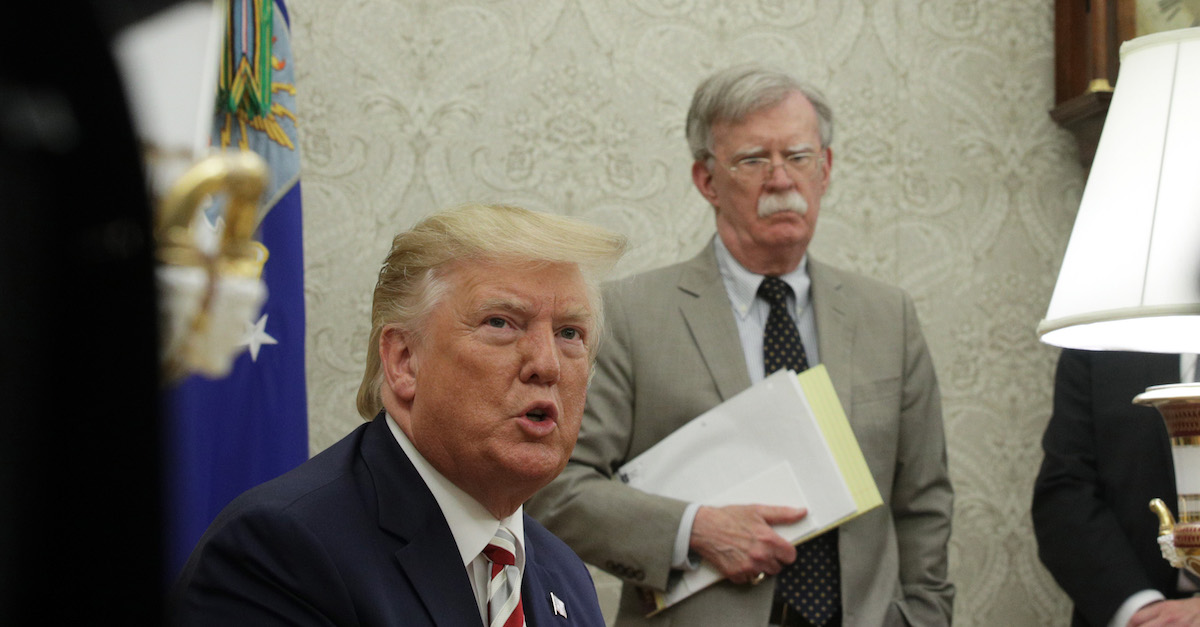
First Amendment attorney Floyd Abrams on Friday savaged as “pathetic” the Department of Justice’s (DOJ) attempt to secure a temporary restraining order against the publication of John Bolton’s embarrassing book about the Trump White House.
“What do you make of the government’s argument that the Bolton book should be not published even though it has been written and shipped and all sorts of reporters have it [and] excerpts have appeared?” guest host Brian Ross asked during a segment of The Dan Abrams Show on SiriusXM. (Floyd Abrams is the father of Law&Crime founder Dan Abrams.)
To which the elder Abrams replied:
I really think it’s just a nonstarter as a legal argument. It’s one thing for the government to make claims that Mr. Bolton has violated his obligations–I don’t think that’s a strong claim but that’s a claim–but to say that, in a situation where the book’s already out, where it’s around the world, where Simon & Schuster sent it to lots of people, where the press has it and is reporting on it–the notion of asking a judge to enter into order which cannot be enforced, effectively, can’t be enforced because he can’t give the relief the government wants in a meaningful sense.
The DOJ argued in a telephonic hearing on Friday that their request for an injunction should apply to Bolton and other third parties, which could include his publisher, book distributors, and possibly even retail stores. That position strained the bounds of legal credulity for various reasons, of course, but one of Attorney General Bill Barr’s subordinates made it anyway.
“The book is out, so the idea of [telling the judge to] enter an order in effect saying: ‘Well, no more books,’ is a meaningless effort,” Abrams noted. “And particularly because what they’re seeking is a prior restraint, an injunction, a bar on publication. That’s the hardest thing to get of all. It’s what the First Amendment most clearly protects against.”
Abrams is well-positioned to elucidate on the prior restraint standard; he argued the successful landmark case before the Supreme Court which ultimately established it.
In New York Times v. United States, Abrams represented the newspaper against the Nixon administration in a watershed victory for freedom of speech. The case itself had to do with the publication of the Pentagon Papers leaked by Daniel Ellsberg which showed various U.S. presidents had lied to the public about the basis and progress of America’s police action in Vietnam.
“That’s what the Pentagon Papers Case was about–and lots of other cases–making it clear,” Abrams continued, noting the almost impossible barrier the government must meet when it attempts to censor a publication. “It might be possible, but the government has to show terrible harm, and it has to be sure that the harm would occur, and there’s no other way to deal with it.”
Bolton’s attorney, Charles J. Cooper, naturally cited to the case Abrams won in a 175-page legal document dropped late Thursday night in his case. “Any system of prior restraints of expression comes to th[e] Court bearing a heavy presumption against its constitutional validity,” Cooper wrote, quoting and citing the court’s opinion in New York Times.
Abrams went on to say that the U.S. vs. Bolton situation “as a legal matter” seems to be “a futile and self-defeating effort by the government and one which cannot and I believe will not be granted.”
“So, why would they make such an obviously pointless request you think?” Ross quizzed the nation’s most famous First Amendment attorney. “What’s the strategy?”
Again, Abrams had nothing but contempt for that legal effort:
I can only conclude it’s not strategy, but it’s the president. That he told them to do everything: “Fire whatever atomic bombs you’ve got of a legal nature.” And someone was unwilling to say “no,” so they’re going in on that to show how strong they are and how much they care [about what the president says], etcetera, etcetera, because, as a legal claim, it’s really pathetic.
[image via Alex Wong/Getty Images]